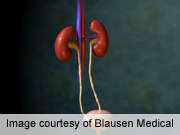Guideline statements have been developed for the diagnosis, prevention, and follow-up of patients with kidney stones, and published in the August issue of The Journal of Urology.
(HealthDay)—Guideline statements have been developed for the diagnosis, prevention, and follow-up of patients with kidney stones, and published in the August issue of The Journal of Urology.
Margaret S. Pearle, M.D., Ph.D., from the American Urological Association Education and Research Inc., in Linthicum, Md., and colleagues reviewed the literature to develop a clinical framework for the diagnosis, prevention, and follow-up of adult patients with kidney stones. Evidence-based guideline statements were developed using data from 46 studies.
The researchers developed guidelines to inform clinicians regarding use of screening for first-time and recurrent stone formers. Evaluation should include a detailed medical and dietary history, serum chemistries, and urinalysis. Stone analysis should be obtained at least once and imaging studies should be reviewed to quantify stone burden. In high-risk patients, additional metabolic testing should be conducted. Recommended diet therapies include limiting sodium intake and calcium consumption, as well as regulating fluid intake to achieve appropriate urine volume. Thiazide diuretics should be recommended for patients with high calcium and recurrent calcium stones; other therapies include potassium citrate, allopurinol, and cystine-binding thiol drugs.
"The guideline statements offered in this document provide a simple, evidence-based approach to identify high-risk or interested stone-forming patients for whom medical and dietary therapy based on metabolic testing and close follow-up is likely to be effective in reducing stone recurrence," the authors write.
Several authors disclosed financial ties to the pharmaceutical industry.
More information:
Abstract
Full Text
Journal information: Journal of Urology
Copyright © 2014 HealthDay. All rights reserved.






















